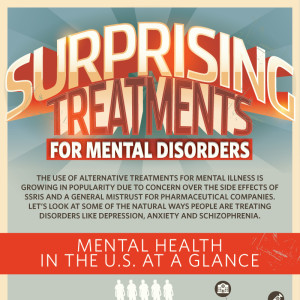Surprising Alternative Treatments for Mental Disorders
The use of alternative treatments for mental illness is growing in popularity due to concern over the side effects of some medications and a general mistrust for pharmaceutical companies. Let’s look at some of the natural ways people are treating disorders like depression, anxiety and schizophrenia.
Mental Health in the U.S. at a Glance
9.6 million
Adults (18+) in the U.S. with a serious mental illness (1)
52.6%
Percentage of those with a serious mental illness who used prescription pills to treat their condition in the past year (1)
36.2 million
Number of Americans who paid for mental health care services in the span of a year (1)
Remedies
While a combination of medicine and therapy can help many individuals suffering from a mental illness, some people are seeking other methods of treatment. What options are out there?
Depression:
Acupuncture
An ancient Chinese practice, acupuncture works to redirect your body’s flow of energy using carefully placed needles. For depression, pressure points in the hands and feet are targeted to increase the flow of “qi.” (2)
Hypnosis
Using hypnosis allows a sufferer of depression to achieve a bettered mood and deal with negative thoughts or attitudes. Consistent hypnotherapy sessions have, in some cases, been shown to lessen the severity of a patient’s depression more so than cognitive behavioral therapy. (3)
Magnesium supplements
What began as an old home remedy for headaches and restlessness still works today to treat symptoms of depression. A little bit of magnesium can be found in our diets, in things like seafood and coffee. But taking an extra supplement can only help, as most adults don’t get the recommended dose of 320 mg to 420 mg daily. (4)
Anxiety
Biofeedback
During a biofeedback session, electrodes are placed on the patient’s skin; the patient can then see his or her heart and breathing rates on a monitor. Stress is then introduced and the patient must use relaxation techniques (deep breathing, guided imagery, meditation) to calm themselves. They can instantly see the feedback on the monitor and see that they can indeed control their body’s responses to stress. (5)
Yoga
While there are many different kinds of yoga, the practice as a whole has been known to calm anxieties and relieve stress. Yoga’s emphasis on breathing is beneficial to those with anxiety problems, who develop improper breathing habits that intensify symptoms. (6)
Kava
Though the safety of long-term use is debated, kava extract has been found to be effective in the short-term treatment of anxiety. Studies have shown that users feel the symptoms of anxiety less often, and depression levels also drop. But the supplement should only be taken for a short period of time for acute anxiety and stress. (5)
Personality Disorders
Ayurveda
Ayurvedic treatment for mental illness takes the body as a whole and includes herbal intake, massage, changes in diet and meditation. (7)
Homeopathy
Using the principle that you should treat like with like, homeopathy works to balance that which is imbalanced in the body to trigger its natural healing process. (7)
Reflexology
Reflexology is said to improve mood and energy flow, which can both help the ups and downs of disorders like manic depression and schizophrenia. (7)
Who’s Buying?
Are people actually using alternative and complementary medicine? Let’s take a look at the numbers.
$34 billion
Spent per year in the U.S. on alternative medicine for general use (8)
According to a 2007 survey completed by the National Institutes of Health, 38% of adults and 12% of children admitted to using some form of complementary or alternative medicine. (9)
$33.9 billion
The amount spent in 2007 on alternative care and visits to practitioners of alternative care (9)
In another national survey by the NIH, 16.5% of respondents had used alternative medicine for mental health care. (10)
Sources:
1. http://www.nimh.nih.gov
2. http://psychcentral.com
3. http://www.abouthypnosis.com
4. https://www.psychologytoday.com/us
5. http://www.webmd.com
6. http://www.depressionanxietydiet.com
7. http://www.emergenceplus.org.uk
8. https://www.wbur.org/radio/programs/onpoint
9. http://nccam.nih.gov
10. http://www.ncbi.nlm.nih.gov







